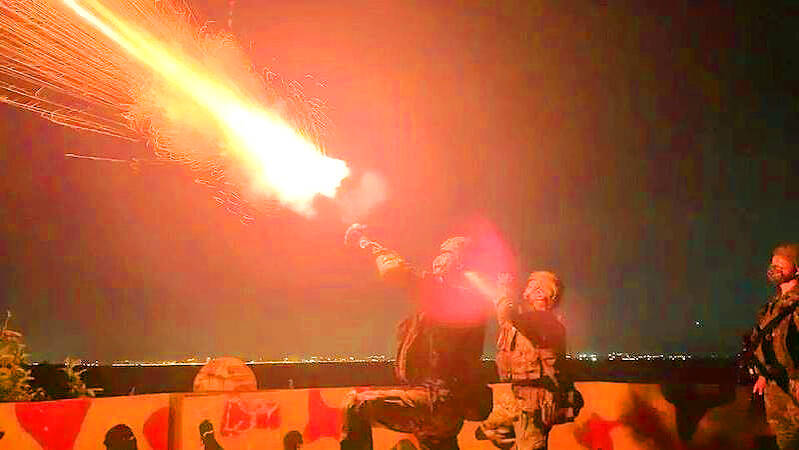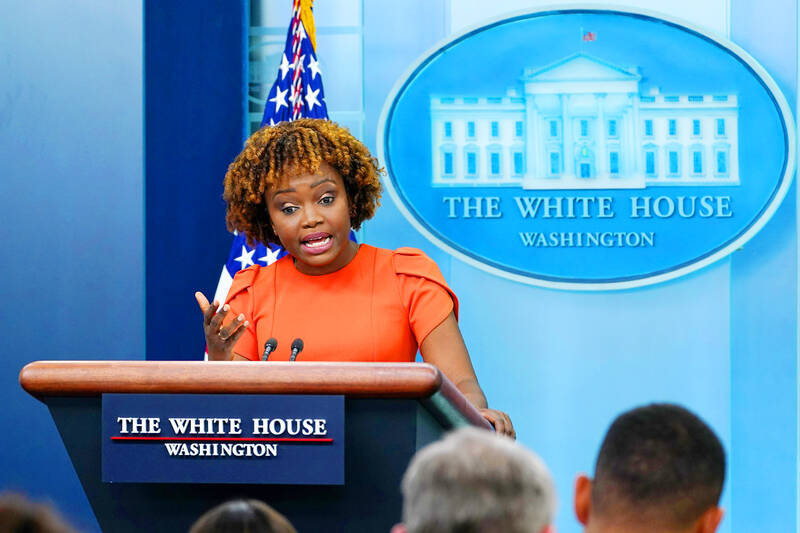The US would not accept Chinese maneuvers that attempt to establish a “new normal” across the Taiwan Strait, a White House official said on Monday about recent Chinese drone incursions on Taiwan’s outlying islands.
China has been trying to turn up the heat on Taiwan after US House of Representatives Speaker Nancy Pelosi visited Taipei early this month, US National Security Council spokesman John Kirby said.
He was answering a question during a conference call about how the US might react to a recent spate of drones from China that have been spotted over Taiwan’s outlying islands.

Photo courtesy of the Kinmen Defense Command
If it is true, it would appear to be in keeping with the Chinese People’s Liberation Army’s efforts — including Chinese warplanes flying over the median line of the Taiwan Strait — to establish a “new normal” regarding its activity in the Strait, Kirby said.
“We are simply not going to accept whatever new normal the Chinese want to put in place,” he said.
The Ministry of National Defense has called the repeated Chinese drone incursions near small islets in Kinmen County examples of China’s “cognitive warfare” campaign against Taiwan.

Photo: AP
Premier Su Tseng-chang (蘇貞昌) yesterday said that the Cabinet would fully support the ministry’s need to deal with the threat, a likely reference to its proposal to install a new anti-drone system by next year in Kinmen and Lienchiang counties.
Separately, White House press secretary Karine Jean-Pierre on Monday said that the US would continue to conduct standard air and maritime transits where international law allows in the Taiwan Strait to show its commitment to freedom of navigation and to protect the region.
“You will see in the coming days and weeks and months that our presence, posture and exercises account for China’s provocative and destabilizing behavior, with a view toward guiding the situation in the western Pacific toward greater stability,” Jean-Pierre told a news conference.
Two US Navy warships transited the Taiwan Strait on Sunday, the first such passage since China launched days of military drills around Taiwan after Pelosi’s visit.
A statement released by the 7th Fleet of the US Pacific Command said that the two ships were Ticonderoga-class guided-missile cruisers the USS Antietam (CG-54) and the USS Chancellorsville (CG-62).
Separately on Monday, Taiwan’s army released a four-step standard response to incursions by Chinese drones.
In a news release, the Kinmen Defense Command said that soldiers posted on Shi Islet (獅嶼) detected an uncrewed aerial vehicle flying at an altitude of 30m in a restricted area about 200m from the outpost at 4:08pm on Monday.
Based on standard response procedures for such incursions, soldiers fired warning flares before the drone flew away, heading to Xiamen in China about 5km away at 4:09pm, it said.
The command also made public for the first time what it described as its four-step response procedure for drone encounters, consisting of “firing warning flares, reporting the incursion, expelling the drone and ultimately shooting it down.”
It was not immediately clear if the response was drawn up recently or had been in place before the recent uptick in drone incursions.
However, it was the first time that the army divulged its response measures on a step-by-step basis, perhaps due to criticism of its lack of a serious response to more frequent drone incursions.
The ministry said it has been refraining from more aggressive countermeasures such as shooting drones down to avoid further escalating cross-strait tensions.

INVESTIGATION: The case is the latest instance of a DPP figure being implicated in an espionage network accused of allegedly leaking information to Chinese intelligence Democratic Progressive Party (DPP) member Ho Jen-chieh (何仁傑) was detained and held incommunicado yesterday on suspicion of spying for China during his tenure as assistant to then-minister of foreign affairs Joseph Wu (吳釗燮). The Taipei District Prosecutors’ Office said Ho was implicated during its investigation into alleged spying activities by former Presidential Office consultant Wu Shang-yu (吳尚雨). Prosecutors said there is reason to believe Ho breached the National Security Act (國家安全法) by leaking classified Ministry of Foreign Affairs information to Chinese intelligence. Following interrogation, prosecutors petitioned the Taipei District Court to detain Ho, citing concerns over potential collusion or tampering of evidence. The

TRADE: The premier pledged safeguards on ‘Made in Taiwan’ labeling, anti-dumping measures and stricter export controls to strengthen its position in trade talks Products labeled “made in Taiwan” must be genuinely made in Taiwan, Premier Cho Jung-tai (卓榮泰) said yesterday, vowing to enforce strict safeguards against “origin laundering” and initiate anti-dumping investigations to prevent China dumping its products in Taiwan. Cho made the remarks in a discussion session with representatives from industries in Kaohsiung. In response to the US government’s recent announcement of “reciprocal” tariffs on its trading partners, President William Lai (賴清德) and Cho last week began a series of consultations with industry leaders nationwide to gather feedback and address concerns. Taiwanese and US officials held a videoconference on Friday evening to discuss the

NEGOTIATIONS: The US response to the countermeasures and plans Taiwan presented has been positive, including boosting procurement and investment, the president said Taiwan is included in the first group for trade negotiations with the US, President William Lai (賴清德) said yesterday, as he seeks to shield Taiwanese exporters from a 32 percent tariff. In Washington, US Trade Representative Jamieson Greer said in an interview on Fox News on Thursday that he would speak to his Taiwanese and Israeli counterparts yesterday about tariffs after holding a long discussion with the Vietnamese earlier. US President Donald Trump on Wednesday postponed punishing levies on multiple trade partners, including Taiwan, for three months after trillions of US dollars were wiped off global markets. He has maintained a 10 percent

PERSONAL DATA: The implicated KMT members allegedly compiled their petitions by copying names from party lists without the consent of the people concerned Judicial authorities searched six locations yesterday and questioned six people, including one elderly Chinese Nationalist Party (KMT) member and five KMT Youth League associates, about alleged signature forgery and fraud relating to their recall efforts against two Democratic Progressive Party (DPP) legislators. After launching a probe into alleged signature forgery and related fraud in the KMT’s recall effort, prosecutors received a number of complaints, including about one petition that had 1,748 signatures of voters whose family members said they had already passed away, and also voters who said they did not approve the use of their name, Taipei Deputy Chief Prosecutor